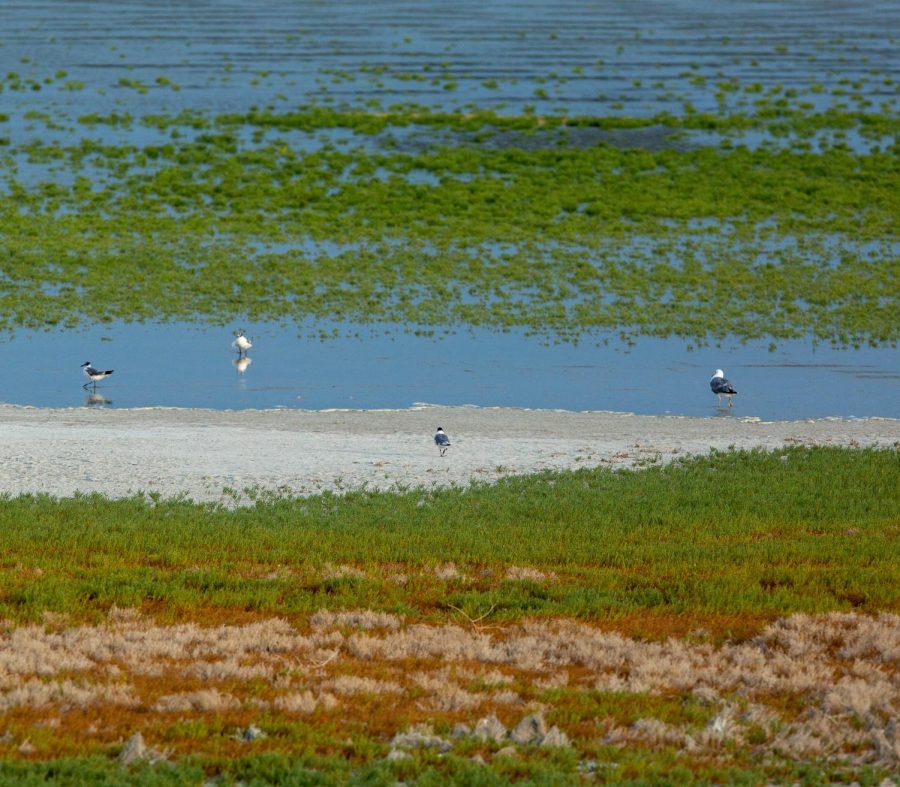What Utah Lawmakers are Doing to Address Water Issues and the Great Salt Lake Crisis
California Gulls and Black-Necked Stilts wade in shallow water on the east shores of the Great Salt Lake in Syracuse, Utah on July 27, 2021. (Photo by Gwen Christopherson | The Daily Utah Chronicle)
February 9, 2023
As Utah continues to face a historic drought, lawmakers are trying to address drying lakes and water rights. Utah state legislators named last week of the legislative session “Water Week” to discuss these issues and pass legislation to solve ongoing water issues.
The Great Salt Lake reached historically low levels last year, furthering concerns of it drying up and releasing toxic dust into the valley. A study out of Brigham Young University warns that if no action is taken to save the lake, it could be dried up completely in five years.
What Lawmakers are Doing
Sen. Jen Plumb’s S.B. 92 creates a Great Salt Lake Preservation support special group license plate. Funds received from purchasing a Great Salt Lake license plate will go to the Sovereign Lands Management Account, which helps preserve the lake and its ecosystem.
Plumb introduced the bill to the Senate floor, where it passed on Feb. 1 and now awaits a House vote to determine if it will go into effect.
“My hope is that the goodwill and hope across our entire state regardless of affiliation … we all care about this issue, and that this would be a way for folks to express that,” she said on the Senate floor.
Sen. Nate Blouin’s S.C.R. 6 would have set a minimum target elevation goal of 4,198 feet for the Great Salt Lake. However, it was struck down in a Senate committee hearing on Feb. 1.
Blouin said he introduced the resolution in hopes of celebrating the work being done by legislators to preserve water rights and save the Great Salt Lake, but the committee decided to move past the bill.
“I think there is a value in having a target and having some priority there, frankly, because we’ve got most of the state’s population living within a pretty short distance of the lake and we’re facing some pretty serious health challenges,” he said in an interview with The Chronicle.
The committee voted 2-4 against S.C.R. 6. Blouin said his colleagues thought the bill was prioritizing the Great Salt Lake over other bodies of water.
Sen. Scott Sandall thought the bill would divert attention away from other issues such as the economy. “Taking the position that we’re going to set a number on a terminal lake … tends to elevate it above a holistic approach to everything else in our economy,” he said during the committee meeting.
Sandall introduced a bill to address how municipal and county commissions must work with the Division of Water Resources in creating development plans. The legislation also allocates funds to the Department of Natural Resources, the Department of Environmental Quality and the Department of Agriculture and Food. The bill, S.B. 76, has passed the Senate and is waiting for further consideration in the House.
Rep. Calvin R. Musselman’s H.B. 307 would establish a new statewide nonprofit partnership to address water conservation. The program would be called Utah Water Ways and its job would be to sponsor policy discussions about water use, coordinate conversations between different departments and create campaigns addressing water use on the individual and corporate levels. It has passed the House and now goes to the Senate.
State legislators are not the only ones working to address water issues. On Feb. 3, Gov. Spencer Cox issued an executive order to raise the causeway berm on the Great Salt Lake to keep snowfall in the southern part of the lake to raise water levels.
It remains to be seen whether lawmakers are doing enough to combat drying lakes and address water rights across the state. Blouin said Utah needs to take more proactive action if these issues are to be solved.
“I think it’s going to be more expensive to screw it up and not take the biggest shot we can right now rather than coming back after the fact and trying to save the lake after it’s really, really dead,” Blouin said.









Penney Waller • Feb 11, 2023 at 2:01 pm
I moved here about a year ago and I have spoke about this to many people most of which have never heard about the Great Salt Lakes drought and poisonous gasses. The national news covers it more than the local news. It’s a real shame. Thanks for writing about this!